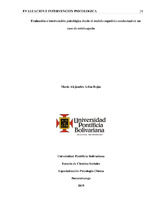| dc.contributor.advisor | Ávila Lázaro, Jairo | |
| dc.contributor.author | Ariza Rojas, María Alejandra | |
| dc.coverage.temporal | 2019 | |
| dc.date.accessioned | 2020-10-29T16:52:56Z | |
| dc.date.available | 2020-10-29T16:52:56Z | |
| dc.date.issued | 2019-03 | |
| dc.identifier.uri | http://hdl.handle.net/20.500.11912/6250 | |
| dc.description | 119 páginas | spa |
| dc.description.abstract | En el presente estudio de caso único se presenta la comprensión y formulación de un plan de evaluación e intervención para el diagnóstico de Trastorno de estrés agudo, el cual se realizó en el centro de proyección de Piedecuesta, con una paciente de 45 años en 13 sesiones, basado en las técnicas cognitivo-conductuales de reestructuración cognitiva, técnicas de respiración diafragmática, relajación muscular progresiva, entrenamiento en solución de problemas, habilidades de asertividad y la terapia racional emotiva (TRE) de Albert Ellis. Para la evaluación del caso se realizó un análisis pre y post tratamiento, aplicando el inventario de ansiedad Estado-Rasgo (IDARE), inventario clínico Multiaxial de Millón II, inventario de Estrategias de Afrontamiento (CSI), así como una evaluación clínica mediante entrevistas y análisis funcional de la conducta. Los resultados indican que la paciente disminuyó la frecuencia e intensidad de la sintomatología ocasionada por el evento estresante, remitió los síntomas físicos e implementó patrones de respuestas más asertivas y de solución de problemas; igualmente, con la ayuda de la medicación, los síntomas disminuyeron. Se concluye que el plan de intervención propuesto fue efectivo para el tratamiento del caso de estrés agudo. | spa |
| dc.description.abstract | The present case study presents the understanding and formulation of an evaluation and intervention plan for a diagnosis of Acute Stress Disorder, which was carried out in the projection center of Piedecuesta with a 45-year-old patient, performed in 13 sessions, based on cognitive-behavioral techniques of cognitive restructuring, diaphragmatic breathing techniques, progressive muscle relaxation and problem-solving training, assertiveness skills and Rational Emotive Behavior Therapy (REBT) by Albert Elliss. For the evaluation of the case, a pre- and post-treatment analysis was carried out, applying the State-Trait DARE anxiety inventory, the Million II Multiaxial clinical inventory and the CSI Coping Strategies Inventory, as well as a clinical evaluation through interviews and functional analysis of the conduct. The results indicate that the patient decreased the frequency and intensity of the symptoms caused by the stressful event, remitted the physical symptoms and implemented more assertive and problem-solving response patterns, and with the help of the medication, the symptoms decreased, concluding that the proposed intervention plan was effective for the treatment of the case of acute stress. | eng |
| dc.format.mimetype | application/pdf | |
| dc.language.iso | spa | |
| dc.publisher | Universidad Pontificia Bolivariana | spa |
| dc.rights | Attribution-NonCommercial-NoDerivatives 4.0 International | * |
| dc.rights.uri | http://creativecommons.org/licenses/by-nc-nd/4.0/ | * |
| dc.subject | Intervención psicológica | spa |
| dc.subject | Terapia cognitiva | spa |
| dc.subject | Terapia conductual | spa |
| dc.subject | Stress (Psicología) | spa |
| dc.subject | Psicoterapia racional emotiva | spa |
| dc.title | Evaluación e intervención psicológica desde el modelo cognitivo conductual en un caso de estrés agudo | spa |
| dc.type | Especialización | spa |
| dc.publisher.department | Escuela de Ciencias Sociales | spa |
| dc.publisher.program | Especialización en Psicología Clínica | spa |
| dc.type.hasVersion | publishedVersion | spa |
| dc.description.sectional | Bucaramanga | spa |
| dc.description.degreename | Especialista en Psicología Clínica | spa |


